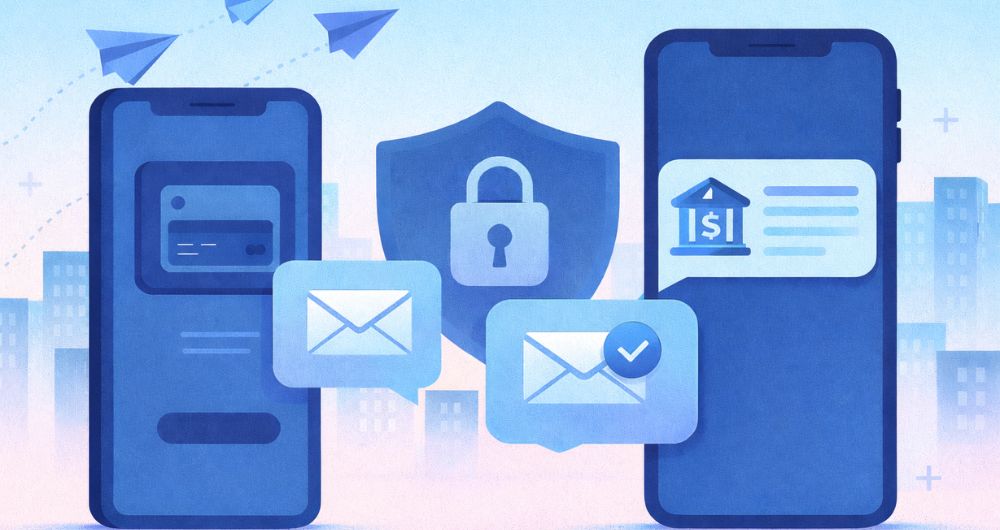
The use of SMS messages has become a cornerstone for urgent notifications, two-factor authentication, personalized promotions, and real-time customer support. However, to fully capitalize on these benefits, financial institutions must choose an SMS provider that meets their rigorous requirements and standards.
In this article, we’ll delve into the essential factors banks should consider when evaluating potential SMS messaging service providers. From security and regulatory compliance to integration capabilities, we’ll break down the key criteria that define the ideal partner to help financial institutions deliver exceptional communication.
The Importance of SMS in Banking Communication
SMS has become an essential tool for banking communication, standing out for its immediacy, security, and reliability. Initially introduced as an additional channel, it has evolved into a cornerstone for enhancing customer relationships and optimizing operational processes within financial institutions.
Informational alerts about account activity, payments, and transfers have become widely adopted SMS services. According to a study by Oriol Ros, Marketing Director at Latinia:
- 83% of banks use SMS to deliver existing services through an additional channel.
- 65% leverage it for cross-selling products.
- 58% use it to personalize the multichannel experience for their customers.
These alerts have gained high acceptance among users, who appreciate the speed and accessibility of SMS messages.
SMS is also widely employed for transactional activities, such as confirming operations or managing payments, opening new doors for mobile banking. In fact, 41% of surveyed institutions reported that SMS not only helps reduce operational costs but also serves as an additional channel to maintain customer relationships, complementing other options like phone banking, email, and physical branches.
With the integration of micro-applications, some banks have begun offering advanced services, such as credit applications or ticket purchases via SMS. This innovation allows customers to carry out transactions more seamlessly and accessibly, enhancing the banking experience and unlocking new business opportunities.
What Should the Ideal SMS Provider for a Bank Offer?
SMS is a cornerstone of banking communication, but its effectiveness relies on proper implementation and partnering with a trusted provider.
A failure in an authentication message, a missed security alert, or a delayed verification SMS can compromise customer security and erode trust in the bank. Additionally, the exposure of sensitive data, such as phone numbers, not only harms the institution’s reputation but can also lead to legal penalties.
For these reasons, selecting the right provider is essential to ensure a secure, reliable, and effective service. Here are the key factors to consider when making this critical decision.
Compliance and Security
Regulatory compliance is a cornerstone that any SMS provider for a bank must guarantee. Financial institutions operate in highly regulated environments where data protection and customer privacy are top priorities. As such, the provider must strictly adhere to both local and international regulations, such as the General Data Protection Regulation (GDPR) in Europe and region-specific laws like the Telephone Consumer Protection Act (TCPA) in the United States.
A provider that fails to comply with these regulations exposes the bank to legal penalties and reputational harm. Additionally, the provider must ensure the security of message content through end-to-end encryption, secure storage, and regular audits to maintain compliance and data integrity.
Operational Reliability
Operational reliability is critical when selecting an SMS provider to ensure messages are delivered without delays or disruptions. In banking, even a slight delay in message delivery can have serious consequences. For instance, if a credit card expiration alert fails to reach the customer, they may face unexpected fees or inconveniences.
The provider should have a robust infrastructure capable of handling high message volumes while maintaining service quality. This includes:
- System redundancy: Ensuring uninterrupted service in the event of technical failures.
- Reliable delivery rates: Providing clear metrics on effective message delivery.
- 24/7 availability: Operating with near 100% uptime to guarantee services are always accessible.
A provider with these capabilities is essential for maintaining customer trust and ensuring seamless banking operations.
Guaranteed Deliverability
Deliverability is a critical factor to ensure SMS messages reach the intended recipient efficiently and without delays. In the banking sector, where messages often contain sensitive information or are tied to important transactions, it’s essential for the provider to guarantee timely delivery to the correct recipient.
The provider should have direct access to multiple delivery routes (known as A2P or Application-to-Person routes) to minimize disruptions and avoid network congestion. Additionally, real-time monitoring tools are a must, enabling the immediate detection and resolution of delivery issues.
Integration Capabilities
The provider must seamlessly connect with the bank’s existing systems, ensuring that SMS messaging integrates naturally into the bank’s operational processes.
For instance, it’s crucial that the provider can interact with critical event management systems, ensuring that important messages like fraud alerts or payment denials are delivered in real time.
Moreover, integration with tools that analyze customer behavior in real time is essential. Technologies such as Next Best Action (NBA) engines help determine the most appropriate action the bank should take at any given moment. SMS providers can then deliver these personalized and relevant communications effectively.
A provider that facilitates such integrations by offering flexible, well-documented APIs will enable the bank to optimize its operations without requiring significant changes to its existing systems. This not only reduces implementation costs and time but also enhances the customer experience by delivering faster, more personalized services.
Message Personalization
In the banking sector, the personalization of SMS messages are essential for enhancing the customer experience and strengthening their emotional connection with the bank. A provider should offer tools that enable tailoring the content of messages based on each customer’s individual characteristics and needs.
Messages can include the customer’s name, specific references to their financial products, or personalized reminders about payment due dates. Personalization can also extend to the language or format of the messages, ensuring they are accessible and relevant to each customer segment. This not only improves response rates but also reinforces the customer’s perception of receiving a service tailored uniquely to them.
A provider capable of delivering this level of personalization becomes a strategic ally, helping the bank offer more relevant and effective communications that drive customer satisfaction and loyalty.
Advanced Features
Advanced features are essential for an SMS provider to meet the specific needs of the banking sector, enabling optimized communications and new ways to engage customers.
Key capabilities include the integration of technologies like Rich Communication Services (RCS), which enhances the messaging experience by allowing rich content such as images, interactive buttons, and direct response options.
Additionally, the provider should offer real-time reporting tools that allow the bank to monitor the status of sent messages. This includes details on delivery, opens, and any potential delivery issues, enabling quick decision-making and campaign optimization.
Practical Use Cases: SMS for Various Banking Needs

An SMS provider must be capable of addressing a bank’s diverse operational needs, ensuring this channel is effective across a wide range of scenarios. Here are some key use cases in the banking sector:
- Account Activity Notifications: Automated messages that inform customers about account transactions, such as deposits, transfers, charges, or withdrawals.
- Payment and Due Date Reminders: SMS can remind customers of key dates, such as loan payments, credit card installments, or financial product renewals.
- Multi-Factor Authentication (2FA): For processes requiring an extra layer of security, such as logging into online banking or authorizing transfers, SMS delivers unique authentication codes to protect accounts.
- Security Alerts: Real-time notifications that alert customers to unusual transactions or suspicious attempts to access their accounts.
- Application and Request Tracking: Updates on the status of processes like account openings, loan approvals, or card issuance.
- Personalized Promotions and Campaigns: SMS can communicate offers, promotions, or exclusive benefits to specific customer segments, driving interest and engagement.
- Financial Education and Awareness: Messages can provide financial tips, alerts about relevant banking products, or notices of policy or fee changes.
- Appointment Confirmations: For in-person services, SMS can confirm appointments at branches or meetings with advisors, reducing cancellations and improving the bank’s scheduling efficiency.
By addressing these varied needs, an SMS provider can help banks streamline operations, enhance customer satisfaction, and maximize the value of their communication strategies.
How to Find Your Ideal SMS Partner
Choosing the right SMS provider for a bank can be a complex and demanding process. It requires evaluating multiple options, ensuring regulatory compliance, verifying technical capabilities, and aligning the selection with the bank’s strategic needs. This effort not only consumes time but also significant staff resources.
At Latinia, we simplify this process through our Partner Program, specifically designed for banks looking to optimize operations and expand their service offerings. With our network of verified providers, banks can access reliable, tailored solutions without investing excessive time in preliminary research.
Key Benefits of Latinia’s Partner Program
- Verified Providers: Each partner in our network undergoes a rigorous technical and quality evaluation to ensure they meet the highest standards in the financial sector.
- Expansive and Reliable Network: Our network includes strategic providers across Latin America and the United States, offering both international perspective and local expertise.
- Access to Experts: We connect banks directly with telecommunications specialists, streamlining negotiations and ensuring successful implementation of solutions.
- Time Optimization: We expedite the provider selection process, significantly reducing the workload for bank teams and allowing them to focus on other strategic priorities.
With the backing of Latinia’s Partner Program, banks can trust they are working with the best providers, maximizing efficiency, and minimizing risks in managing SMS communications.
Turn the selection process into a strategic advantage and take your bank to the next level with Latinia. Contact us today to learn more about our Partner Program and powerful real-time messaging solutions.
Categories: Strategy
